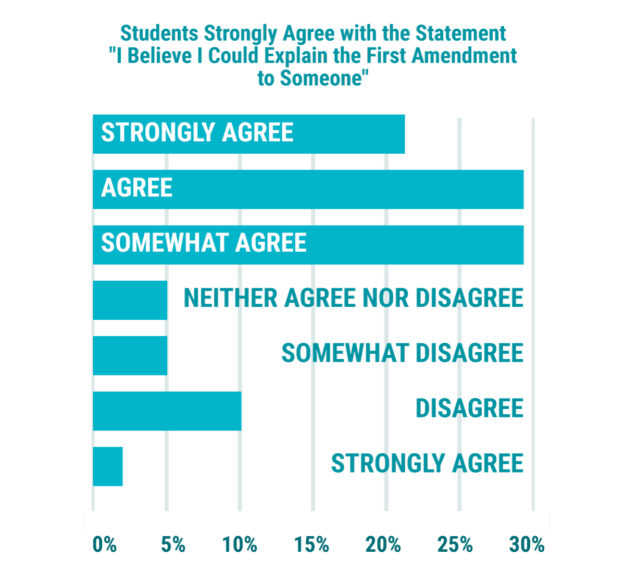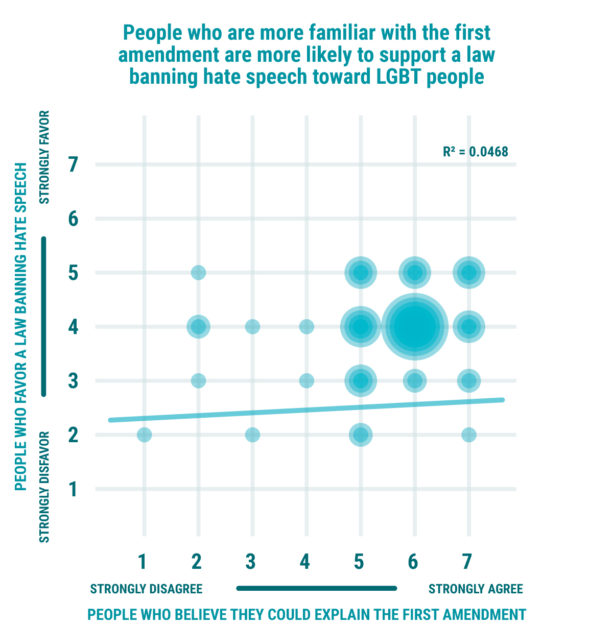Naomi Robinson chose to major in political science for a reason.
“I think it’s really important to understand how people think and make decisions about policies for our country,” she said. “I want to know why people create laws and what impact they see those laws having.”
At a religious university like BYU-Idaho, many students are governed by values of compassion and understanding, and are fighting against discrimination.1 Students at this university are also largely familiar with and in fervent support of first amendment rights.
These things can seem in conflict, however, when addressing hate speech and the government’s role in protecting individual rights. A survey of BYU-Idaho students revealed unexpected findings on how students view this relationship of speech rights and discrimination.

A survey explored how BYU-Idaho students perceive the first amendment and their opinions on the role it should play in a variety of circumstances. A total of 44 students participated in this survey. Students were asked “To what extent do you agree or disagree with the following statement? – I believe I could explain the First Amendment to someone.”
Of these respondents, 79% agreed to some degree that they believed they could explain the first amendment to somebody. Only 17% of respondents disagreed with that statement, and 5% neither agreed or disagreed. This strong majority suggests that these students are not only familiar with the first amendment, but are confident that they understand it.
This preliminary understanding that most survey participants know the first amendment informed the further data analysis results of this study. This survey asked students to describe their favorability towards several proposed policies related to the restriction or freedom of speech in different circumstances.
Students were asked ““To what extent do you favor a law that would make it illegal to say offensive or insulting things in public about gays, lesbians, and transgender people?”

The above chart plots their responses to that question, with 1 meaning “strongly disfavor” and 7 meaning “strongly favor,” and plots their response to the previous question “To what extent do you agree or disagree with the following statement? – I believe I could explain the First Amendment to someone.”
The analysis revealed a positive correlation, suggesting that those who were more likely to say they could explain the first amendment are more likely to support a law prohibiting hate speech towards LGBT people.
It’s important to note that the correlation is weak and doesn’t tell the whole story. Of those respondents, nearly half (45%) stated they neither favored nor disfavored the proposed policy. Only 31% stated they somewhat agreed, and no respondents said they strongly agree.
Abigail Jones Southerland published a paper entitled “The Tug of War Between First Amendment Freedoms and Antidiscrimination” which explored the complex discussion taking place in the United States about hate speech and its protection – or lack thereof – under the first amendment.2
Within her study she analyzed several cases of states and foreign countries enacting antidiscrimination laws. In most situations, these antidiscrimination policies – particularly those connected with LGBT rights – resulted in censorship of those expressing personal moral opinions, when no harm was inflicted on the minority group in question.
“Overly broad antidiscrimination laws, made applicable by state government, prevent private citizens from expressing an opposing view to a moral issue,” Southerland said in conclusion to her analysis.
The neutrality of student responses suggest they may not have developed strong opinions on the subject. There is an apparent inconsistency between supporting first amendment rights and censorship laws. These ideas can coexist, but additional factors need to be considered under further research.
As for Naomi, she wants to get to the bottom of understanding how and why people think the way they do. She’s fascinated by the discourse on rights and freedoms, and wants to find the answers for how to approach these ideas. But until then, she’ll keep studying the first amendment.
Sources:
- Brigham Young University | Idaho Student Living. https://www.byui.edu/student-living/student-living-lessons
- The Tug of War between First Amendment Freedoms and Antidiscrimination: A Look at the Rising Conflict of Homosexual Legislation. By: Southerland, Abigail Jones, Regent Journal of International Law, 15387550, 2007, Vol. 5, Issue 1
